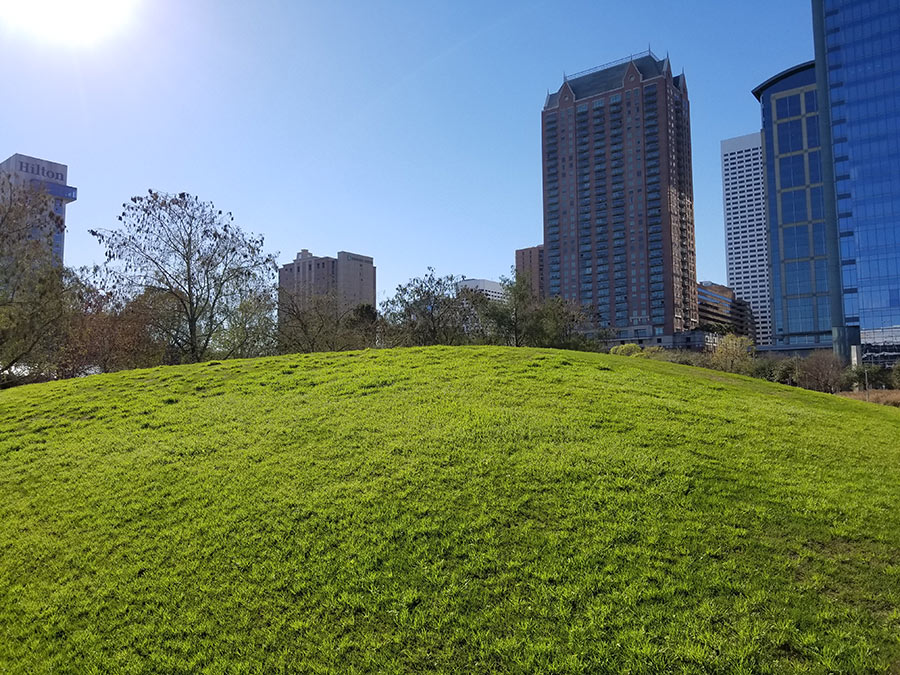
- Greater Houston Partnership Doesn’t Have To Open Its Books, Texas Supreme Court Rules [Houston Chronicle]
- Tema’s 7-Story Apartment Complex Under Construction on Hermann Dr. Renamed Capella Museum District [HBJ; previously on Swamplot]
- Houston’s Housing Market Considered ‘Unhealthy’ According to Nationwide Insurance’s Health of Housing Markets Report [HBJ]
- Abandoned Garden Oaks Home at 738 W. 43rd St. To Be Demolished ‘For Safety Reasons’ [The Leader; previously on Swamplot]
- Some Flooded Homeowners Face Steep Costs To Rebuild To Meet Floodplain Regulations [Houston Chronicle]
- Grupo Posadas To Open Live Aqua Hotels in Houston, Chicago, Los Angeles, Miami, and D.C. [HBJ]
- Sneak Peek at Chris Kinjo’s New MF Sushi Going Up in the Museum District [Culturemap]
- Delayed Openings Until August or September of Heights Restaurants Bernadine’s, Hunky Dory, Foreign Correspondents Blamed on Heavy Rains [HBJ]
- Artist Michael Savoie Unveils Massive Public Mural at Smith and Elgin [Culturemap]
- A Preview of James Glassman’s ‘Houstorian Dictionary’ [Houston Chronicle]
- Houston the Third Sweatiest City in the Country, Behind Miami and Tampa, According to Honeywell List [Houston Chronicle]
- Touring Armand Bayou Nature Center, The Closest Thing To What Houston Looked Like Before Concrete Sprawl [Houston Chronicle]
Photo of Rice Hotel: Curt Littlejohn via Swamplot Flickr Pool
Headlines





The Chronicle story is a good one but it misses a critical component. Because of the legislative restriction on the amount an appraisal district may increase assessed value every year, HCAD has pushed all value increases into the land value and reduced the structure value by the amount required to comply with the 10% per annum cap. As a result in in town areas like those that flooded, you have structure values ranging from $5,000 to $90,000, even in places where the market value of improvements is closer to $200-$300k.
These are the values the city is using and no amount of flood insurance can overcome that hurdle. After Alison the city was a lot more lenient about letting homeowners “stage” permitting, but values have increased dramatically since then. And, I suppose, it’s a lot harder to hold the line when 55,000 houses flood than it is when only 2,500 do.
Picture of Rice Hotel – if that’s how the sign looks currently, they should just take it down now that it’s lobby will be closed to the public. They could save some money on electricity as well as cut down confusion for downtown visitors who may think it’s actually a hotel
Surprised the TX AG office supported making the records of GHP open; not surprised they are able to stay secret.
Re: unhealthy real estate market in Houston – flippers are pricing their remodels and new builds “aggressively” in our neighborhood — try “unrealistically” and “wtf are you thinking?”
The Greater Houston Partnership’s refusal to show what it spends public $$ on speaks volumes.
We toured the Armand Bayou Center one time and didn’t see one animal, bird, reptile, or insect. and we were really looking. True story.
Man, I really feel bad for those folks who got flooded out in Meyerland. I know I should have some kind of “what were you thinking buying in a floodplain” attitude, but honestly I just can’t help but feel terrible for them. I can’t imagine where someone comes up with the cash to elevate or rebuild an entire house. We’re talking about a lot of folks whose lives are damn near ruined because of this. It’s a real shame. Although…I guess following on this logic, forcing them to elevate their houses will make them the last ones to feel this crush.
Nice Pic, Kurt Littlejohn.
RE: the Erwins and others in their predicament of having a home in the flood zone…
One might think think the the tax-collecting entity would INSURE your property stay livable!
But in the Real estate Wild West, the Erwins lot along with all their flooded neighbors can become something else.
Though condemned to become a swamp…
A developer with deep pockets can build multi-family units on top of several levels of parking garage (all floodable, but that’s spelled out in the lease’s fine print…)
This will bring more tax dollars to the City AND bring retail development on its coat-tails.
A colossal win-win!
Except fot the Erwins.
Movocelot–I live in meyerland, I cannot imagine the hoa would waive the tight deed restrictions to allow a developer to build a multi family unit with a parking garage. As the deed restrictions are here now, you have to get approval to even repaint your house the same color it is now.
@ Txcon: HCAD does vigorously defend land vlaue, however its not my understanding that state law regarding the 10% cap on yearly increases for a homestead exemption break out the circumstances based on land value.
@ MrEction: On a related subject. Its interesting that HCAD will acknowledge the effect on value of being in the flood plain on land values for properties in the floodway or 100-year floodplain, but NOT on improvement values. A house with living area at some particular Base Flood Elevation (BFE) is subject to the functional obsolescence posed by the casualty loss risk and also the legal/political risk from these city ordinances. These obsolescence factors may be curable or incurable, but this storm demonstrates that they are a very big deal. They shouldn’t be treating improvements that are fixed-in-place as though they’re buoyant and watertight or otherwise movable. Its incredibly irresponsible, and frankly they ought to have the ability to process the data that the Harris County Engineering Department has already assembled for each structure.
The Chronicle piece was an education for me. I did not know the flood insurance capped out at $250K. Does that pay out regardless of whether you put it toward a rebuild or walk away from your house/sell it? I assumed that the people who elevated after Allison’s damage did so with a significant insurance payout. It really had not occurred to me that those folks had to significantly finance those rebuilds to stay in their neighborhoods.
Separate Q — Has there been anything written up about whether the sound walls along 610 caused a fishbowl effect for those houses in Meyerland? There’s minimal to no drainage at the bottom of those walls, so when the water came into the neighborhood from Braeswood/Rice, it had no outlet at 610.
Separate Q 2 –Are all of the Willow Water Hole basins eventually supposed to take water off Brays Bayou? A neighbor mentioned the piping project along Greenwillow by the synagogue was marked WWH. If yes, was there any tally of how much water those basins took just from the rain and street runoff? Is there any concern that connected basins would themselves overflow?
@TheNiche I don’t know how the state law mandates the value split between land and improvement value, but I know how HCAD does it because I live in one of these areas and have dealt with this issue in a previous flood. They comply with the legislative cap by reducing the structure value and assigning all value increases to the land. This would be less of an issue if the city were to instead look at appraised value or market value but not “assessed value.” It’s an accident of the intersection of these two laws (state law and city ordinance) and appraisal district policy, rather than conscious flood plain management that’s preventing these home owners from rebuilding.
That was my point.
Heather: not sure on either of your points. I do know the sound barriers are a point of contention bc I believe the neighborhood wants them to be taller. And there have been discussions w/txdot about them. However, I am lucky bc I live just a few houses away from the barrier, the houses right next to them flooded pretty bad and only my garage and laundry room got around and inch of water or less. Should change my screen name to “nervous in meyerland about future flooding”!